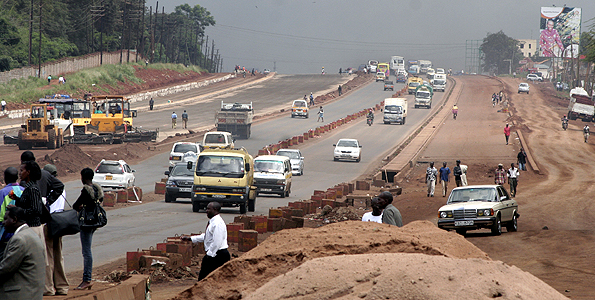Firms cut off Thika Road face relocation
Businesses that have been cut off by the construction of Thika Road will have to move after the government on Tuesday ruled out carving out access roads to the premises.
Officials blamed poor planning by local authorities for the mess.
John Mwatu, the project team leader, said the contractors building the road would stick to the original design of the highway despite requests by sections of the business community for special arteries linking them to the main road.
“Allowing unplanned flow patterns on the highway will cause traffic glitches,” Mr Mwatu told a stakeholders’ forum hosted by the Kenya Alliance of Resident Associations (Kara) in Nairobi on Tuesday.
Cut travel time
The highway is expected to cut the time it takes to travel between Thika and Nairobi from two hours to 30 minutes.
Expansion of the Nairobi-Thika road from a four-lane to an eight-lane superhighway with numerous interchanges and flyovers has cut off some businesses that were initially accessible from the old road.
Notably affected by the construction of the 50.4-km road are businesses in areas such as Kasarani, Githurai 45, Ruaraka, Ruiru, Juja and Survey.
Although some businesses like those along Murang’a Road can reached through back roads, squatters who have built shanties may have to be moved to open up the access roads.
Members of the business community told the forum that they risked losing investments running into billions of shillings if no exits and feeders roads to the highway were built. Investments on Murang’a Road alone are estimated at Sh10 billion.
Dyer and Blair chairman Jimnah Mbaru said recently that access to over 200 business premises had been closed.
Among the affected establishments were hotels, petrol stations, two mosques, apartments and car dealerships.
Some analysts said the dilemma facing the traders raises concern over flaws in planning by councils.
“Most local authorities tend to be driven by highway dynamism and will approve almost any plan that is targeted at locations close to key roads or highways. Unfortunately, this beats the logic of highways because of uncoordinated entry or exit by traffic,” Ibrahim Mwathane, a planning expert, said.
Others claimed that the stand-off between the government and business owners also pointed to lack of sufficient consultation during the project planning phase “Stakeholders need to be involved more when planning projects that affect them directly. Some of the challenges being encountered now would have been tackled beforehand,” Stephen Mutoro, CEO of Kara, told participants.
“We called for views from the communities and stakeholders within the project corridor but only a few turned up,” said Meshack Kidenda, the director-general of the Kenya National Highways Authority (Kenha).
Mr Mwatu said the government would develop regulations to guide the location of petrol stations on the highway.
“We are looking at having petrol stations at intervals of at least five kilometres, coinciding with turn-off or exit points to avoid interfering with the flow of traffic,” he said.
Special attention will be given to densely-populated sections of the highway such as Githurai 45, which is already witnessing gridlocks caused by passenger service vehicles (PSV) that pick and drop passengers on the main road.
“We have acquired a five-acre plot to build a bus park in Githurai so that the PSVs can stop blocking the road. The construction of the terminus will be done by the municipal council,” Mr Mwatu said.
Special foot bridges designed with ramps for use by the disabled will also be added in key sections of the superhighway.
The project is expected to be completed by March despite massive variations in cost due to a weakened shilling and high cost of fuel. Initially valued at Sh27 billion, the projected could cost Sh9.5 billion more, reflecting a 35 per cent deviation on completion.
Privatising maintenance
Global prices of crude oil have risen sharply in recent times, partly driven by political and social unrest in the Middle East and North Africa.
This has hit the road construction sector hard because key materials used for paving, such as bitumen and the diesel used to drive heavy machinery, are derived from petroleum.
“The costs of cement and steel have also climbed tremendously and duly reflected in the cost of the project,” Mr Kidenda said. Maintenance of the highway will be privatised.


